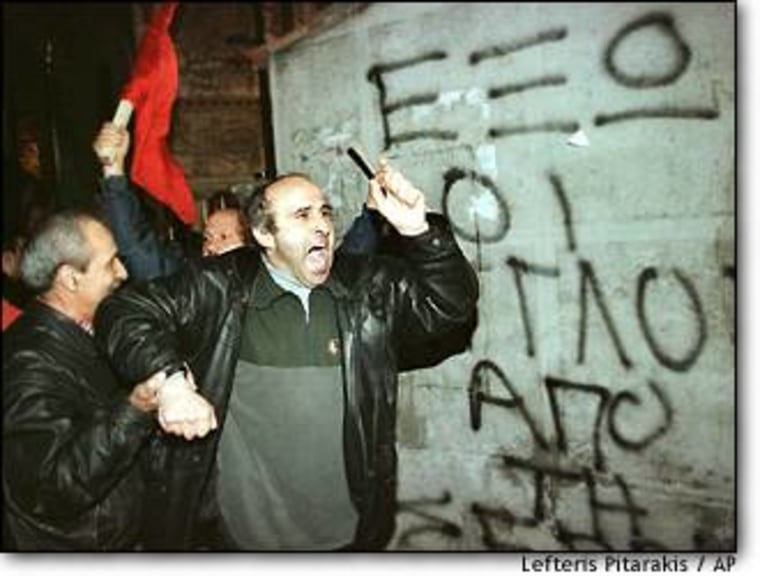Seething with frustration and resentment, deeply convinced of a conspiracy against their culture and their religion, the Slavic world is horrified by the NATO air campaign against Yugoslavia. With Russia leading the way, a coalition of nations with a collective ax to grind against the Roman Catholic Church, the Muslim world and the “Anglo-Saxons” who run NATO vow they will not stand by while their Serb brethren are attacked. Is a Slavic curtain about to descend on Europe?
WHEN BATTLE is joined, the views of the enemy are immediately discounted. During the Cold War, the Soviet Union’s very real fear of yet another German resurgence in this century was disregarded, just as its own horrific regime was papered over while “Uncle Joe” Stalin was helping the West whip Hitler.
That’s all fine and good in the name of victory. But there’s usually a price to pay. At the Yalta conference in 1945, the United States and Britain did disregard the Soviet Union’s fear of yet another German Reich. The mistake fed a paranoia that predated Lenin in the Russian psyche. It also helped seal Eastern Europe’s fate as a Soviet-dominated “buffer-zone” running right to the German border.
BACK TO THE FUTURE?
Could something similar be happening today? The black-and-white analysis of Kosovo — popular in Washington now that the Balkans have attracted a “general audience” — lays the blame completely on Yugoslav President Slobodan Milosevic and his “lust” for an ethnically pure Serbian state. The ethnic Albanians of Kosovo in this scenario are a simple, tractor-driving people whose yearnings for democracy have been cruelly crushed by Serbia.
InsertArt(433491)This is, of course, horribly over-simplified. Ethnic cleansing was not copyrighted by the Serbs in Bosnia and the Kosovo Liberation Army is not a group of choir boys. Nonetheless, it’s the fairy-tale version of the Kosovo conflict that the Clinton administration, and to a lesser extent its European NATO allies, have found themselves forced to embrace as the bombing drags on. Confronted with the inevitable question, “Is it worth risking American lives?”, the Clinton administration has responded by comparing the Kosovo crisis with the causes of World War I and the Hitler’s genocide.
Many will argue that such exaggeration is warranted in wartime. Perhaps. It certainly has served to build support among an American public so comfortably oblivious that it can’t be bothered to find places like Serbia (let alone Kosovo) on a map. Ronald Reagan, of course, did much the same thing in his day. In 1984, in a speech intended to build support for another war of dubious relevance to national security, Reagan reminded Americans that Harlingen, Texas, is closer to Nicaragua than it is to Maine.
The problem, however, is that inaccuracy in such high places also reinforces the conspiracy theories that have always defeated efforts at multi-ethnic harmony in the Balkans. Not just in Serbia, but in Russia, Greece, Bulgaria and Macedonia, too.
BEHIND THE SLAVIC CURTAIN
Russia’s harsh reaction to the NATO decision to go to war was said to have taken some in the West by surprise. If so, the fault probably rests primarily with Russia. In almost every crisis since the collapse of the Soviet Union, some Russian official or another has raised the “threat of a new Cold War” or even “World War III” as a consequence if Moscow’s word is not heeded.

In past crises when Russia cried “wolf” — over Iraq and on NATO expansion — the issue at stake clearly involved Russia’s national interest. Russia desperately wants Iraq to be in a position to repay billions of dollars in debts owed from the Soviet era and felt threatened by NATO’s foray into Eastern Europe. When Russia didn’t get its way in past crises, the options were limited. As long as economic reforms were a national goal, cooperation with the West (and the IMF money it brought) was a priority. Besides, until last August’s ruble crisis, President Boris Yeltsin’s government was mildly pro-western and definitely anti-communist.
This time, however, Russia’s reaction is more visceral, more emotional and for that reason more troubling. Russia’s national interests are only marginally involved. Yet Russia today is bankrupt and appears to have less than ever to lose and more to gain from opposing the West. Despite the “don’t move or I’ll blow my head off” quality to some of Moscow’s rhetoric, the attack on Serbia is viewed by all segments of Russian society as a blow not only against an old ally but against the Slavic, Eastern Orthodox world in general.
The NATO air campaign “will go down as one of the blackest days in the post-war history of Europe,” said Russia’s Foreign Minister Igor Ivanov.
HISTORY OF TROUBLE
It is hard to understate the power of history in the Balkans and no one has manipulated it better than Milosevic. For Serbs, there are three historical experiences against which all other things are measured: their 600-year rule by the Muslim Ottoman Empire, the butchering Serbs endured at the hands of the Nazi-backed Croatian state in World War II, and their “betrayal” by the West at Yalta, when Churchill and Roosevelt agreed that Eastern Europe would be part of the Soviet Union’s “sphere of influence.” That treaty left Serbia in the hands of Tito’s Communist state and its complex federal system specifically designed to water down Serbian dominance.
Milosevic rode these resentments to power in the late 1980s, particularly the anger in Serbia that the sacred land of Kosovo had become a majority Muslim region. History was and is his weapon. In this modern world, a naive performance like the Balkan history lesson Clinton delivered on the eve of the war to an American audience, is also heard in Serbia itself.
Yugoslavia’s media this week has deftly skewered Clinton’s statements, pointing out inaccuracies in his account of Balkan history on the eve of the war (Clinton claimed the Balkans had spawned “two world wars in this century,” forgetting, of course, that World War II began with a German attack on Poland.) Serbia’s state-controlled media has also reveled in the historical ironies of their situation: the last time Belgrade was bombed was April 1941, when Germany’s Luftwaffe flattened much of the city and Serbs were being herded into death camps by Hitler’s Croatian and Muslim allies.
TAKING ACCOUNTS
So what should the West make of the complaints of the Slavs? Certainly, no one who spent anytime in Sarajevo during the Bosnian Serb siege of that city can fail to see the irony in the current situation. Serb artillery rained 2,000 shells a day on civilians in the Bosnian capital. Their plight drew a yawn in Russia that looks suspicious next to the outrage coming out of Moscow today.
In many ways, Russia bears a huge share of the blame here. Alone among the nations involved in the pre-war Kosovo peace negotiations, Moscow had some influence on Milosevic. If Russia failed to convince him to sue for peace, how can Clinton, or Richard Holbrooke or French Foreign Minister Hubert Vedrine be faulted?
Russia’s bluff should be called. If Russia is the great power it demands to be treated as, it is time for Moscow to put its own Slavic house in order. NATO’s strategy of bombing Milosevic into a peace treaty may never succeed and Russia may crave the satisfaction of saying “I told you so.” But if Russia is capable of moving Milosevic, now is the time to do it, before the careless rhetoric really does lead to a new Cold War.
Michael Moran is MSNBC’s International Editor
